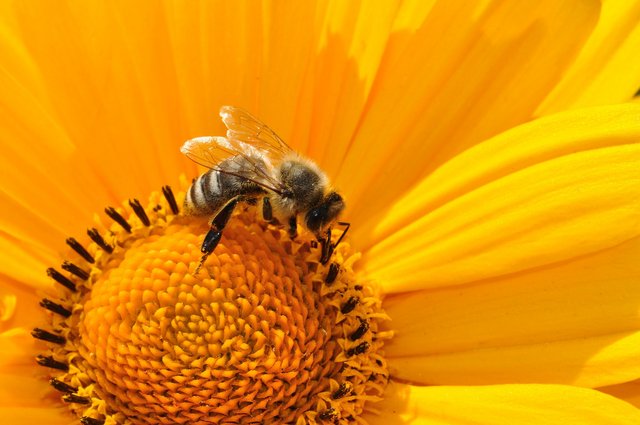What would happen if all the bees dissaper?

Bees have a bad reputation, but they're actually pretty awesome creatures who are just misunderstood. Yes, we’re all afraid of being stung, but the chances of that happening are actually quite low. Bees are crucial to the ecosystem, and life as we know, it would be drastically different without them. So in this article, we’re going to take a look at how our lives would change if all the bees in the world disappeared.
So, what are bees? Bees are a type of flying insect, and are a part of the same family that includes wasps and ants. There are actually more than 20,000 different species of bee- from the most common European honey bee, to the furry bumblebees. According to fossil records, bees date back to around 100 million years ago, and since then have been an integral part of the development of the earth’s ecosystems. Bees are an incredibly important factor in the reproduction cycle of flowers. They live in large colonies and feed on the nectar and pollen of plants. The nectar provides them with the energy they need to fly around, and pollen provides them with protein and other nutrients that they need to survive.
Bees see different wavelengths of light than we do, so flowers act like colorful beacons to them. They fly in and collect as much pollen and nectar as they can, before moving to another plant. Back at the hive,, the unique structures and specialized bees within, transform what they have collected into honey, beeswax, royal jelly, and propolis. These products have been farmed by humans since at least the times of the Ancient Egyptians and Greeks, because of their unique properties. During the collection of these substances, pollen also gets stuck on their bodies. So by flying from plant to plant, they pollinate flowers as they go. They are regarded as ‘critical pollinators’, and are responsible for the pollination of 70 out of the top 100 crop species of the world that feed around 90% of the human population.
In Europe alone, more than 4,000 different vegetables rely on pollinators to fertilize them. Beyond those crops, they also pollinate countless other species of plants, which form the basis of every food chain. These plants are eaten by smaller animals that are then eaten by larger animals, and therefore, the entire ecosystem relies on them. But, if bees were no longer around to fulfill this role, then there would be catastrophic consequences. It would mean the loss of 70% of the most important crops in the world for human consumption, and a large number of food chains would be broken. Supermarkets would only have half as many fruit and vegetables as they offer today. There would also be major shortages of dairy, because dairy cows, sheep, and goats, all rely on bee-pollinated food.
It would become far more difficult to rear animals for meat, so food prices would skyrocket. Diets would be restricted to crops and animals that didn’t rely on bee pollination- things such as pork, chicken, rice, and corn. Within a relatively short period of time, malnutrition could become a major problem for most of the world’s population. Cotton would also cease to grow, which would force us to find alternative materials for clothing, and likely make fabrics far more expensive. All of these effects would send a sharp shock to world economies, with people scrambling for the resources to retain the lifestyles that they have become so accustomed to. Bees aren’t going to disappear overnight, but there is serious concern about falling numbers around the world. In the US, for example, there has been a 40% loss of commercial honey bees since 2006, and similar figures are reported everywhere else It’s thought that this is happening due to a number of factors that are changing the environment.
The greatest concern is industrial agriculture, which uses large amounts of pesticides targeted at other insects, but also kills bees. The destruction of natural habitats to clear areas for farmland, as well as the change in global temperatures and weather patterns due to global warming, are also thought to be contributors. Even though bee populations are already collapsing, it’s not too late to do something about it. Ecological farming, which protects the environment by not using chemicals and encouraging biodiversity, is a great start, and wider protection of wild habitats would further support the growth of different species. Limiting the effects of global warming is also crucial, because bee colonies require stable weather patterns to survive. But if all fails, and the bees do disappear, there’s one option that remains- humans performing the pollination tasks themselves. However, this would require a great deal of manpower and would likely make food far more expensive than it is today.
So in conclusion, bees are vitally important to the pollination of plant life around the world, and it would be catastrophic if they were to disappear. Food supplies would dwindle, whole ecosystems would die out, and even fabrics would become harder to produce. It’s crucial that more steps are taken to prevent this from happening and, since there’s already a good understanding of why it’s taking place, measures shouldn’t be too difficult to implement as long as everyone’s on board with solving the problem.
Congratulations @vinryde! You received a personal award!
You can view your badges on your Steem Board and compare to others on the Steem Ranking
Do not miss the last post from @steemitboard:
Vote for @Steemitboard as a witness to get one more award and increased upvotes!